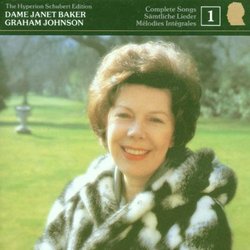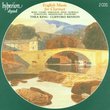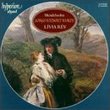A worthy start to a very special series.
John Austin | Kangaroo Ground, Australia | 08/02/2001
(5 out of 5 stars)
"The editorial comment reflects the strong recommendation given to this CD in the "Penguin Guide to Compact Discs". I add my own recommendation also, not only for this CD but for the whole project which it initiates, the plan to provide a truly complete survey of Schubert's song output. The accompanist and moving spirit throughout is Graham Johnson. In his notes, he mentions inheriting a ten-volume Schubert edition, full of pencil markings, from legendary accompanist Gerald Moore. The older accompanist, collectors will remember, made a memorable series of Schubert lieder recordings with Dame Janet Baker. Well here is Dame Janet in her mid-fifties but still in vocal splendour, together with the younger accompanist, recorded in 1987. One of the principles of this huge recording project is to match singers with songs. Anyone privileged to attend a recital by Dame Janet, a tall statuesque figure, will once again enjoy the experience of sharing music that seems to suit her perfectly. In "An den Mond", a song requiring a vocal range of almost two octaves, Dame Janet's lower register is used with remarkable dramatic power. There is, moreover, the miracle of Schubert's genius, illuminating the texts of Goethe, Schiller and other of the German poets. A minor miracle is that such illumination was possible at such a young age. The 17-year-old Schubert begins, for example, the song "Nähe des Geliebten" with a swelling crescendo which accompanist and singer share, wonderfully well-contrived to suggest urgency. Other examples could be provided, but I hope this is enough to recommend this CD, if not the whole edition of 37 or more, to music lovers everywhere."
Is It Franz's Birthday Yet?
Giordano Bruno | Wherever I am, I am. | 06/04/2008
(5 out of 5 stars)
"Schubert Lieder are analogous to lutefisk and roast turkey in my musical life; most of the time I prefer nouvelle cuisine, but once a year I crave them insatiably. That moment came upon me today. I flipped through my Schubert disk, past Auger, past Fischer-Dieskau, past the new Hampton, and snatched out Dame Janet, as usual.
Other people must respond to Baker's performances as enthusiastically, since it's her voice that was chosen for the first release of the huge Hyperion Schubert Edition. The Lieder on this disk are not as familiar as those of the Winter-Trip or the Pretty Miller Girl cycles. They don't "add up" programmatically as the cycles do, either. Instead, Baker sings each of them as a free-standing concert. I found myself clicking my player on and off, taking breaks, to allow the echoes of one song to fade before starting another.
Schubert's songs are poem settings above all. The strophic structure of the poem sets the structure of the song. The words of the poem are the musical moods of the song. Fortunately, Schubert chose many of the greatest lyric poems by Germany's greatest poets for his compositional inspiration. A Lieder singer has to deliver the words intelligibly, with agile tongue and lips. Despite a recognizably British accent in her German, Janet Baker sings words, not merely musical vowels.
Vibrato was taught as essential to a "good tone" thoughout Dame Janet's long career in opera, and her technique employs vibrato to a degree I find unpleasant from other singers. But Baker's vibrato is never wide, never conceals the pitch, truly does enhance her tone. Some of these songs span two octaves or more in range. Baker's lower octave was, at this stage in her career, huskier and more masculine than her upper; a noticeable octave break is usually considered a flaw in vocal technique, but on these songs Baker uses it artfully to enhance the dramatic intensity of her singing.
Graham Johnson's piano accompaniment is more modulated than passionate, allowing Baker to "center" the songs around her voice and the words. I like everything about this CD, and I predict that I will again next year, when my Schubert craving returns."


 Track Listings (19) - Disc #1
Track Listings (19) - Disc #1
